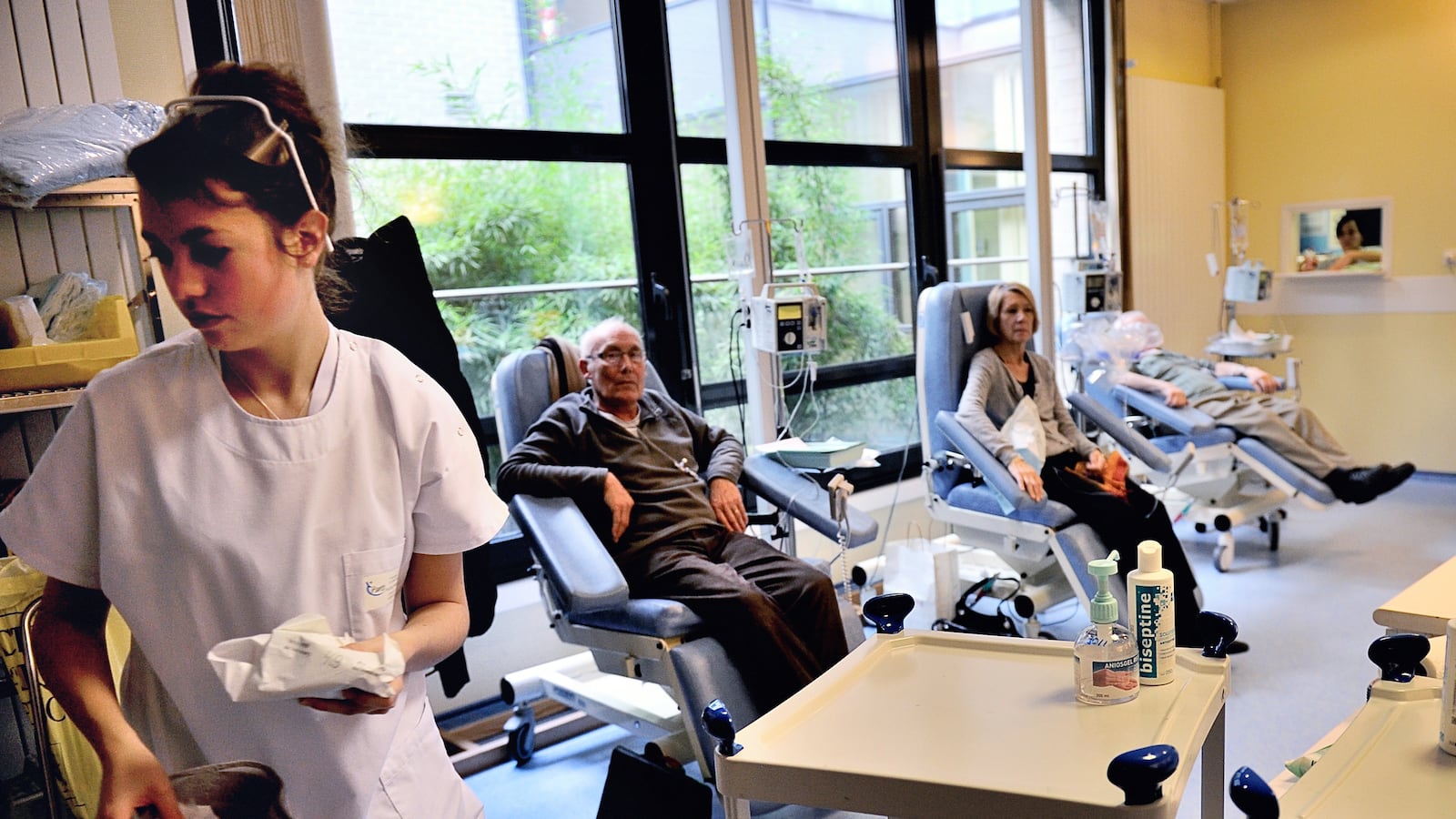The growing chorus of pols and pundits who dismiss President Obama’s warnings about the sequestration cuts as fearmongering should talk to cancer researchers. Leaders at several esteemed cancer organizations interviewed for this story all say virtually the same thing: the cuts will have a profoundly negative and long-lasting impact on cancer research and cancer patients.

Why? Because the proposed reductions in nondefense discretionary funding will result in deep slices at the National Cancer Institute (NCI)—whose main responsibility is conducting and funding cancer research. While no one knows just how deep the cuts will be at NCI, which is part of the National Institutes of Health (NIH), several sources say they’ll be at least 5 percent. NCI currently is allotted $5 billion of the NIH’s $30.9 billion budget.
“Funding for cancer research is already down, but these cuts at NCI will be devastating,” says Geoff Wahl, a professor in the gene-expression lab at the Salk Institute Cancer Center in San Diego and former president of the American Association for Cancer Research.
Wahl says the expected $250 million cut at NCI, whose budget has already been shrinking for the last several years, will “dramatically reduce the number of cancer-research grants, and as a result, fewer cancer treatments will be discovered and developed for patients.”
According to Rick Borchelt, a spokesman for NCI, the agency gives out about 1,100 grants a year. Says Wahl: “As cancer researchers we need to keep challenging boundaries and thinking out of the box. With pancreatic cancer, for example, we’ve had the same five-year survival rate for 40 years. We need to continue pursuing adventuresome research. But with these cuts, we’ll be even less able to do that.”
In a letter submitted Wednesday to the leaders of both houses of Congress, Louis J. DeGennaro, chief mission officer at the Leukemia & Lymphoma Society, expressed grave concern over the cuts, saying that “continuing a steady flow of resources to support cancer research and the development of innovative therapies—as well as access to those therapies—is essential, as we are on the threshold of bringing new and more effective treatments to patients.”
Scott Lippman, the director of Moores Cancer Center at the University of California, San Diego, says the cuts come at the “worst possible time” because of recent historic advances in cancer research.
“In this era of personalized therapy and the Human Genome Project, we are getting a very good understanding of what drives tumors,” he says. “We know we can have a huge impact, but these cuts will slow this process. They will translate immediately to cancer patients not having access to lifesaving kinds of approaches. It’s demoralizing for those of us in the field. It all comes back to patients. These cuts will have a very real impact on cancer patients.”
One of those patients, Amberley Kowalski, is alive because of the NCI. Kowalski, a young adult cancer survivor from the Chicago area who relapsed twice in short order from her aggressive non-Hodgkin’s lymphoma, was maxed out on her insurance and facing a $300,000 donor transplant as her last option. Then one of her doctors told her about an NIH/NCI trial that had both a new way to treat her cancer and what appears to be a significant improvement in donor-transplant survival.
"Compared to what other places offered, it was a no-brainer,” says Kowalski. “The NIH and NCI saved my life in more ways than one. It’s an amazing place doing amazing things. They do such cutting-edge treatments for people who really need them. Not just for people dealing with cancer now, like me, but for all those in the future, too. Cutting their funding is crazy. Fewer or smaller trials means people like me will die and keep dying.”
Linda Malkas, deputy director of research at City of Hope, a clinical-research center, hospital, and graduate medical school near Los Angeles, says the cuts will change cancer research “not just this year, but for years to come. That sounds dramatic, but it’s true. Some brilliant young scientists will just say there are easier ways to make a living than cancer research.”
Liz Hart McMillan, a cancer survivor, patient advocate, and founder of Hope for Lymphoma, a not-for-profit organization that established some of the first Facebook cancer communities offering patient education and support, with a following of nearly 30,000, says the sequestration cuts will translate to an increase in patient deaths.
“These research cuts will be devastating, and the loss of momentum, particularly in the riskier areas of highest innovation, will slow progress for years,” she says. “Thanks to these cuts, we can count on progress coming too late for too many. And yet the speaker of the house refuses to have a discussion about a more balanced approach to solving things. Is preserving tax cuts to the ultra-rich and corporations with record profits really worth thousands of lives?”




